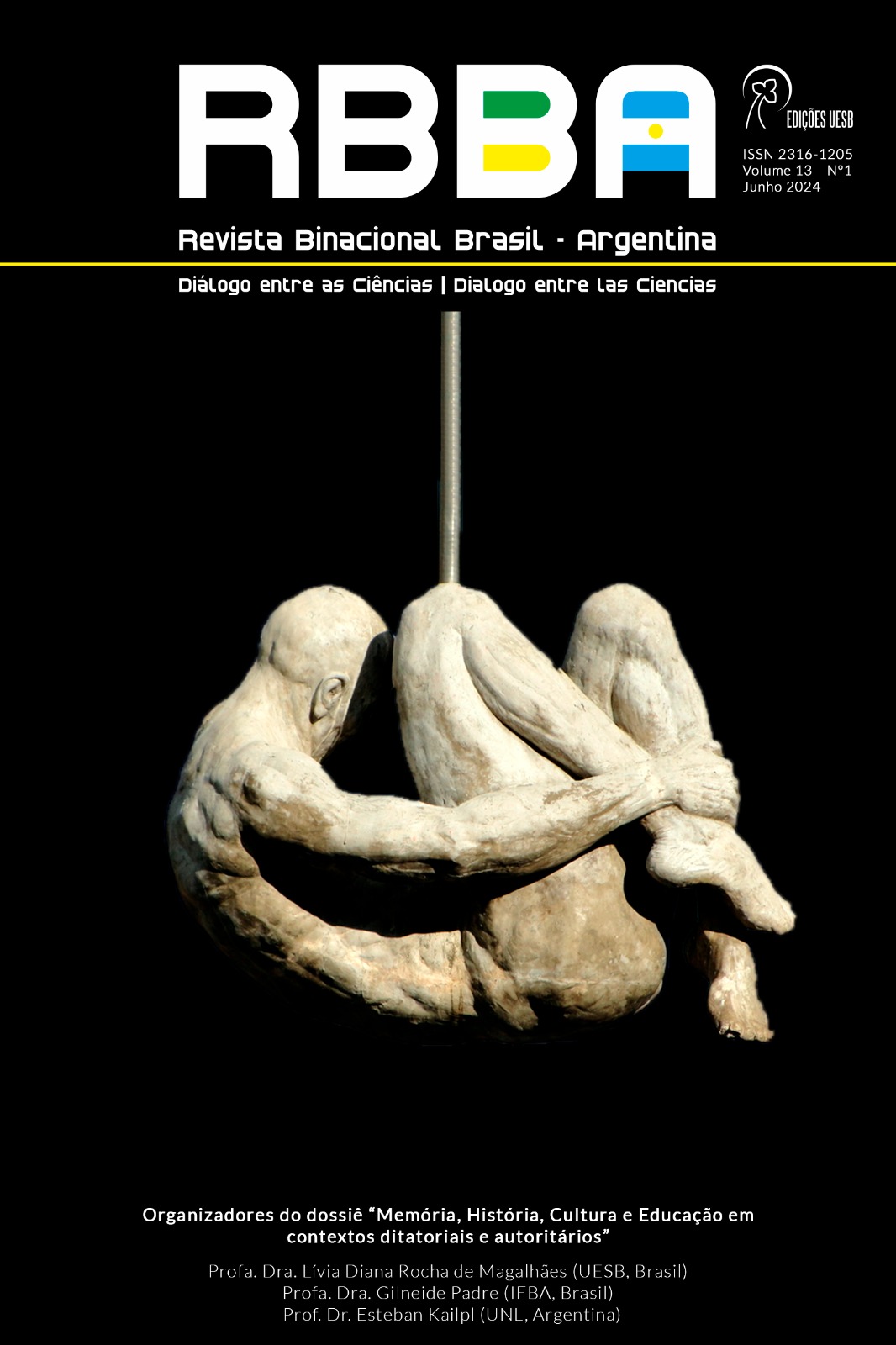Interventions of the political and pedagogical humanist-christian tradition in the Santa Fe region (Argentina) between 1950 and 1983. Contributions to its analysis in times of authoritarianism
DOI:
https://doi.org/10.22481/rbba.v13i01.14820Keywords:
Christianity, Humanism, Third Worldism, Priests, Santa Fe, Recent ArgentinaAbstract
The writing exercise in these lines responds to a specific call for papers for a thematic dossier on memory and history, culture and education in authoritarian contexts. An opportunity to think, organize and organize ideas, readings and dialogues that are part of a complex network of circulation of ideas through actors and institutions in the South American space. The world of ideas and their circulation are the necessary coordinates to investigate the construction of meanings, experiences and resistances around the worker-student identity in a defined space and time. The proposal is to stop our gaze in terms of a medium-term perspective that we can define as part of a Christian humanist programme – on the basis of an abundant academic bibliography on the subject – that is taking shape at different stages and particularly after the Second World War. In these lines, the reader is presented with an approximation as a way of trajectory of a set of experiences, debates and actors of the ecclesiastical galaxy in the city of Santa Fe and the metropolitan region between 1950 and the return to democracy in 1983. A first shared hypothesis is the diversity of interventions that materialize in the city at two well-differentiated moments - albeit in the same political cycle characterized by growing authoritarianism.
Downloads
References
BÜNTIG, Aldo. El catolicismo popular en la argentina. Buenos Aires: Editorial Bonum, 1969.
BÜNTIG, Aldo. La Iglesia en Cuba. Hacia una nueva frontera. CIAS (Centro de Investigación y Acción Social), v. 19; n. 193, p. 5–46, 1970.
BUSANICHE, Mabel [et al.]. Remando: relatos del movimiento de mujeres y disidencias en la ciudad de Santa Fe. 1ª ed. Santa Fe: Ediciones UNL, 2023.
CATOGGIO, María Soledad. La trama religiosa de las redes humanitarias y del activismo transnacional en las dictaduras del Cono Sur de América Latina. En: JENSEN, Silvina y LASTRA, Soledad (Ed.). Exilios: militancia y represión. Nuevas fuentes y nuevos abordajes de los destierros de la Argentina de los años setenta. La Plata: Editorial de la Universidad Nacional de La Plata, 2014. Pp. 187-213.
DONATELLO, Luis Miguel. Catolicismo y Montoneros. Religión, política y desencanto. Buenos Aires: Manantial, 2010.
FOLQUER, Cinthia y FERNÁNDEZ, Sandra. Voces en conflicto en la coyuntura del Concilio Vaticano II en Rosario (1960-1970). En: TENTI, María Mercedes (Comp.) Iglesia y religiosidades de la colonia al siglo XX. Nuevos problemas, nuevas miradas. Rosario: Prohistoria, 2017. Pp. 227-251.
JELIN, Elizabeth. Las luchas por el pasado. Buenos Aires: Siglo XXI Editores, 2017.
KORINFELD, Daniel. Experiencias del exilio. Avatares subjetivos de jóvenes militantes argentinos durante la década del setenta. Buenos Aires: Editorial Del Estante, 2008.
LIDA, Miranda. Historia del catolicismo en la Argentina entre el siglo XIX y XX. Buenos Aires: Siglo XXI, 2015.
LÓPEZ, Verónica. Una Historia de Vida en el contexto de los procesos histórico/políticos en Argentina entre los 60 y la actualidad. Tesina para el grado de Licenciatura en Antropología. Inédita. Universidad Nacional de Rosario, Rosario, 2006.
MALLIMACI, Fortunato. El catolicismo argentino desde el liberalismo integral a la hegemonía militar. En: VV.AA. 500 años de cristianismo en Argentina. Buenos Aires: CEHILA, 1992. Pp. 197-368.
MALLIMACI, Fortunato. El mito de la Argentina laica. Catolicismo, política y Estado. Buenos Aires: Capital intelectual, 2015.
MAURO, Diego. Catolicismo y peronismo en la ciudad guadalupana. De la colaboración al conflicto inesperado (Santa Fe, 1946–1955). En: Di Stefano, R. La ciudad secular: religión y esfera pública urbana en Argentina. Quilmes: Editorial Universidad Nacional de Quilmes, 2020.
MARTÍN, Juan Pablo. El Movimiento de Sacerdotes para el Tercer Mundo. Un debate argentino. Buenos Aires: Editorial Guadalupe, 1992.
PATTIN, Sebastian. Entre Pedro y el pueblo de Dios. Las concepciones de autoridad en el catolicismo argentino (1962-1976). Rosario: Prohistoria, 2019.
OBREGÓN, Martín. Entre la cruz y la espada. La Iglesia católica durante los primeros años del “Proceso”. Buenos Aires: Universidad Nacional de Quilmes, 2005.
SCOCCO, Marianela. Los Sacerdotes para el Tercer Mundo en Rosario, Argentina. Represión, Solidaridad y Derechos Humanos. Revista Pasado Abierto, n. 12, p. 20-247, 2020.
TOURIS, Claudia. Ideas, prácticas y disputas en una Iglesia renovada. Revista Todo es Historia, nº 401, p. 44-52, 2000.
TOURIS, Claudia. Neo-Integralismo, denuncia profética y Revolución en la trayectoria del Movimiento de Sacerdotes para el Tercer Mundo. Prismas, N° 9. 2005. Pp. 229-239.
TOURIS, Claudia. Profetismo, política y neo-clericalismo en el Movimiento de Sacerdotes para el Tercer Mundo (MSTM) en Argentina. Anuario IEHS, Nº 24. 2009. Pp. 477- 499.
ZANATTA, Loris. El Vaticano y el golpe de estado de 1976. El precio de la nación católica. Puentes, Año 8, N° 23. 2008. Pp. 83-98.
ZANATTA, Loris. La larga agonía de la nación católica. Iglesia y dictadura en la Argentina. Buenos Aires: Sudamericana, 2015.
ZANCA, José. Religión y cultura en la Santa Fe de los años 70. Aldo Büntig, entre la sociología y el compromiso. En La política y la cultura bajo la lupa: Santa Fe. Siglo XX–XXI. En: RUBINZAL, Mariela... [et al.] [Compilación]. 1ª ed. Santa Fe: Ediciones UNL, 2022.
Downloads
Published
How to Cite
Issue
Section
License
Copyright (c) 2024 Revista Binacional Brasil-Argentina: Dialogue between the sciences

This work is licensed under a Creative Commons Attribution 4.0 International License.






